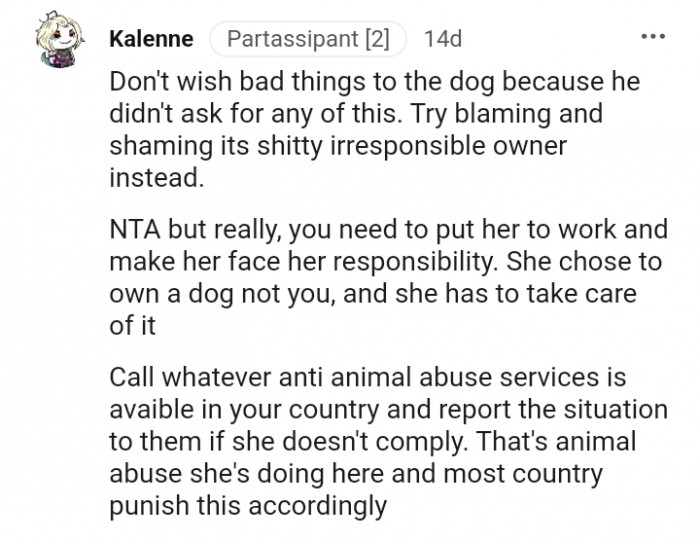Redditor Wants To Know If It's Wrong For Wishing Their Roommate's Senior Dog Was Dead Because Its Life Is Pure Torture
Every dog reaches senior status at some point since aging is a natural aspect of life. It's crucial to understand that older dogs require different care than younger ones.
One of the most difficult things a pet owner has to do is say goodbye to their dog. Of course, we all want to spend as much time as we can with our beloved dogs, and it can be challenging to know when to say goodbye.
However, because we care about them, we also don't want our old or sick dogs to suffer. By evaluating your dog's quality of life, you can decide when it is time to say goodbye and how best to comfort them in their last moments.
The OP in today's story has a roommate who has an older dog (15 years old, to be precise). According to the OP, the poor puppy has been declining severely over the past 3–4 years.
The senior dog is blind; he can’t walk properly because he’s overweight and has bone problems. Not to mention that he doesn’t eat properly and has seizures, among other issues.
The OP is the one cleaning up after the dog, as its owner refuses to care for her dog. The OP swears she’s keeping it alive because she can’t let go, but why won't she take care of her dog?
Keep scrolling to read the entire story in full.
The OP writes

A dog's mobility declines with age; their hearing and vision deteriorate, and they become more susceptible to numerous ailments. Even so, growing older is not a death sentence, and dogs can live long, healthy lives.
Here is the OP's story, which explains why the OP wished the dog were dead.
The OP does not understand why she keeps the poor thing suffering

Truth be told, it gets harder to take care of pets as they age. The owners of aging dogs frequently battle with their pets' dementia and incontinence, in addition to navigating the confusing end-of-life care options.
Here are some of the top comments from Redditors in reaction to the Reddit post.
It's really hard

Understanding Feelings of Frustration and Guilt
The sentiment expressed about wishing a pet would pass due to its suffering reflects deep emotional conflict. Research in animal-assisted therapy indicates that our relationships with pets can evoke profound feelings of attachment, which complicates our responses to their suffering.
When a pet is in distress, it can trigger feelings of helplessness, leading to frustration and even resentment towards the pet owner for not taking action.
Understanding Grief and the Desire for Release
The feeling of wishing a pet were dead due to perceived suffering is complex and deeply rooted in emotional psychology. Dr. Sarah Thompson, an expert in grief and loss, explains that this reaction often stems from a misunderstanding of compassion and the ethical responsibilities we hold as pet owners.
According to a study published in the Journal of Veterinary Behavior, many pet owners experience significant emotional turmoil when faced with their pets’ suffering. This can lead to thoughts of euthanasia as a means of relieving suffering, which can evoke feelings of guilt and shame. It’s important to recognize these feelings as part of the grieving process, highlighting a deep-seated desire for compassionate outcomes.
This Redditor believes the OP shouldn't blame the dog

The conversation about cleaning up after the dog

She could just give the dog to a loving home

According to Dr. Kristin Neff, a leading researcher in self-compassion, "When we witness suffering, it can evoke strong emotional responses, including frustration and helplessness." This frustration may arise from the difficulty of reconciling the pain of seeing an animal in distress with the perceived inaction of its owner. Dr. Neff emphasizes that "these harsh thoughts can be a natural coping mechanism for the emotional turmoil we experience." It's crucial to acknowledge that while these feelings may be uncomfortable, they are a common reaction to prolonged suffering.
Moreover, wishing for a pet's death can also reflect a struggle with helplessness. According to Dr. Tal Ben-Shahar, a renowned happiness researcher, "When we feel powerless, we may project our frustrations onto those we care about, including our pets." Understanding these feelings is crucial to addressing them constructively rather than allowing them to fester. One practical approach is to seek counseling or support groups where individuals can express these feelings in a safe environment. This can facilitate healthier coping mechanisms and emotional processing, allowing pet owners to navigate their complex feelings surrounding their pets' health more effectively.
Dealing with a senior dog is super challenging

This Redditor completely understands the OP's frustration

It is a common problem in elderly dogs

The Complexity of Pet Ownership
Pet ownership is often intertwined with complex emotions, including love, responsibility, and guilt. Research from veterinary psychology shows that owners may struggle with feelings of guilt when they contemplate the quality of life of their pets, particularly in cases of chronic illness.
Understanding that these emotions are common can help alleviate some of the burden that comes with making difficult decisions about a pet's care.
Compassion Fatigue in Pet Owners
Compassion fatigue is a common phenomenon among pet owners, especially when confronting chronic illness or suffering in beloved animals. A study published in the Journal of Applied Animal Welfare Science highlights that prolonged exposure to a pet’s suffering can lead to feelings of emotional exhaustion and detachment.
Understanding this concept can help pet owners recognize their feelings as valid responses to their circumstances. It's crucial to engage in self-care practices during such emotionally taxing times. This might include setting boundaries around caregiving, seeking out supportive communities, and allowing oneself to grieve the anticipated loss while still caring for the animal.
This Redditor is suggesting for the OP to move out

Try blaming and shaming the roommate who is the dog's owner

The OP just had to talk to the roommate about this

One practical approach to coping with these feelings is to engage in open conversations with the pet owner about the dog’s quality of life. Facilitating a compassionate dialogue can help the owner reflect on the dog's needs and their feelings, creating space for more informed and emotionally supportive decisions.
This can also reduce feelings of isolation and frustration that arise from feeling powerless in the situation.
Additionally, it’s vital to consider the role of empathy in these situations. Research in social psychology suggests that empathy can be a double-edged sword, leading to emotional distress when we become too involved in another's suffering. As Dr. Susan David, a renowned psychologist and author, states, "When we feel overwhelmed by others' pain, it can lead to feelings of guilt and helplessness." One way to navigate this is by practicing self-compassion and recognizing that it’s okay to feel overwhelmed. Pet owners must remind themselves that seeking peace and relief for their pets doesn’t equate to failure in their duties as caregivers, as emphasized by Dr. Becky Kennedy, a child psychologist who notes, "Self-compassion is essential for maintaining our emotional well-being, especially in challenging situations."
Not all dogs are regarded as seniors at the same age, so it's critical to identify the early indications of aging and take the appropriate actions to maintain your dog's health. The OP has tried her best to clean up after a dog with whom she has no bond while the real owner relaxes.
What advice do you have for the OP? What would you do differently? Leave your thoughts below.
Psychological Analysis
Wishing for a pet's end can often reflect deep emotional turmoil and a desire to alleviate suffering. It's important to recognize that such feelings are common among pet owners facing the pain of watching their beloved animals struggle. Seeking support and understanding can help individuals process these emotions more healthily.
Analysis generated by AI
Analysis & Alternative Approaches
Ultimately, grappling with the suffering of a pet can evoke a wide range of emotions, including guilt and frustration. Understanding these feelings through the lens of compassion fatigue and emotional psychology can provide clarity and relief.
By fostering self-compassion and seeking support, pet owners can navigate these complex feelings more effectively. Healing from these emotional struggles is possible, and it often involves acknowledging the difficulty of the situation while also caring for oneself.
Exploring the Ethics of Pet Care
The ethical considerations surrounding pet ownership, particularly regarding euthanasia, are complex. According to Dr. Jessica Pierce, an expert in animal ethics, pet owners must weigh their emotional attachment against the animal's quality of life.
Research indicates that having conversations about end-of-life decisions can be incredibly challenging yet profoundly necessary for both the owner and the community around them.
Encouraging pet owners to seek guidance from veterinarians or pet hospice services can provide clarity and support. These professionals can help navigate the emotional landscape and assist in making humane decisions that prioritize the pet's well-being.
Ultimately, reducing suffering should be the core focus of any decision regarding a pet's life.
The Impact of Emotional Burdens on Relationships
Carrying the emotional burden of a pet's suffering can affect interpersonal relationships, often leading to conflict or miscommunication. Research in social psychology shows that unresolved feelings can manifest as frustration and resentment in relationships, particularly when individuals feel unable to express their concerns.
Understanding these dynamics is essential for maintaining healthy relationships, especially when pets are involved.
One actionable strategy is to create a support network among friends or family who can empathize with the situation. Sharing feelings openly can provide relief and validation, helping to dissipate the emotional weight that comes with these challenging circumstances.
Therapeutic practices like journaling or engaging in support groups can also be beneficial for processing these feelings and fostering emotional resilience.
Analysis & Alternative Approaches
In navigating the complex emotions surrounding pet care, it's essential to acknowledge the interplay of love, guilt, and frustration. Research indicates that open communication and support can lead to healthier coping strategies.
By fostering compassion for both the pet and the owner, individuals can contribute positively to the decision-making process, ensuring the well-being of all involved.



